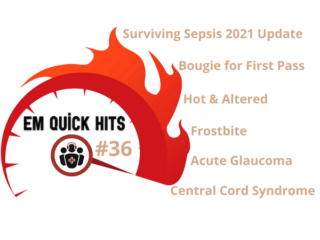EM Quick Hits 36 – Surviving Sepsis, Angle Closure Glaucoma, Bougies, Frostbite, Hot/Altered Patient, Central Cord Syndrome
In this month's EM Quick Hits podcast: Brit Long on Surving Sepsis Campaign -2021 Updates, Nour Khatib on rural medicine case - angle closure glaucoma, Reuben Strayer on bougie vs endotracheal tube and stylet on first-attempt intubation, Justin Hensley on management of frostbite, Sarah Foohey on the hot and altered patient, and Andrew Petrosoniak on central cord syndrome...





